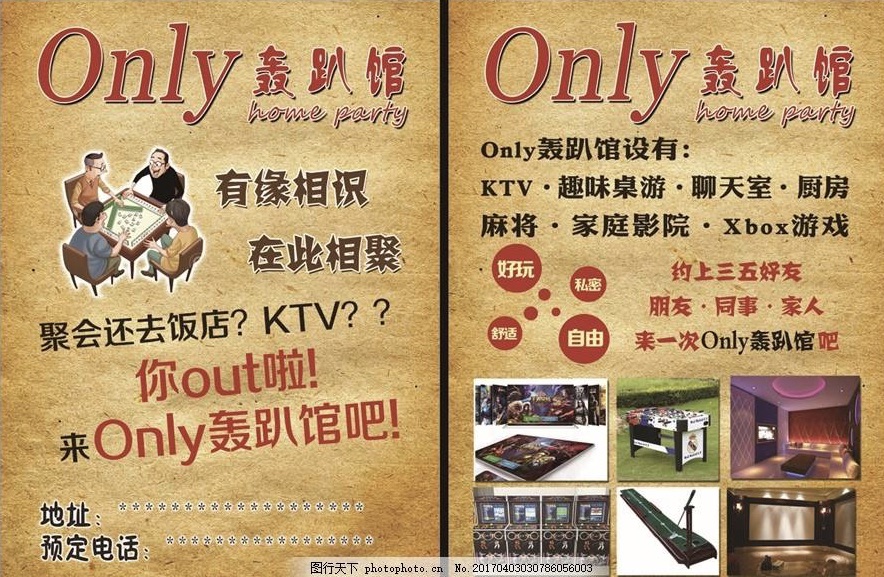Home party
« previous post | next post »
Recently, Tong Wang's husband told her that he would not be home for dinner because he was going out with friends to this place:
I won't translate the entire flyer because there's so much English (e.g., KTV, Xbox) mixed in with the Chinese that it's pretty clear what goes on there. I'll just mention a few items. Most important is that the establishment is called "Only hōngpā guǎn Only 轰趴管" ("Only home party hall"), where "hōngpā 轰趴" not only stands as a partial transcription of "home par(ty)", but also conveys the notion of loudness (hōng 轰 means "bang; boom; blast; bombard; rumble") and perhaps also a bit of rowdiness (pā 趴 means "bend / lean / topple over; lie [prone]; grovel"). The usual transcription of English "party" is "pàiduì 派对" (lit., "send / dispatch correct / facing").
Although the literature on the internet tries to give "hōngpā 轰趴" a respectable pedigree in the West and among early aficionados of things Western in China during the late Qing and Republican periods, it seems to be a recent coinage. As Qing Liao (one of my students from the PRC who tried hard to document the existence of "hōngpā 轰趴" before the last few years) puts it,
When someone in his twenties invites me to a "hōngpā 轰趴" ("home party"), I would not relate it to any forms of home party. Rather, it has a lot of elements that a home party would exclude, such as not being held at one's own home, but someplace like a fancy house in the suburbs.
….
I would say if there is no evidence of "hōngpā 轰趴" ("home party") in earlier texts, then it is a recent invention to advertise "hōngpā guǎn 轰趴馆“ ("home party halls") and was thus given an elegant origin from the West to promote a Western way of living, such as that of a young man going out to "hōngpā 轰趴" ("home party") with friends in a large house.
[excerpts from a long message on the subject]
Here and here are a couple of links about "hōngpā 轰趴" ("home party") in Chinese.
One of the most interesting occurrences of an English term on the flyer is "nǐ out la! 你out啦!", where the English preposition "out" becomes a full-fledged Chinese verb. I leave it Language Log readers to offer their own translations, bearing in mind the context on this advertisement.
I was thinking of titling this post "Rampant bilingualism / biscriptalism", but that should be obvious enough by itself.

Gabriel Holbrow said,
October 13, 2018 @ 9:05 pm
As a possible related word to 轰趴 hōngpā, I offer the Japanese ホームパーティ (hōmupāti, i.e. a Japanized pronunciation of "home party"), which does actually mean a party held at someone's home. I am not sure how old a word ホームパーティ is, but it is at least 25 years old (based on my experience) and had probably been around a while longer than that. I doubt that ホームパーティ is the source for 轰趴, but that is a possibility. They do both share the unideomatic use of "home" (where English would have a "house party" or "party at [my] home").
Bathrobe said,
October 14, 2018 @ 1:05 am
I always thought of "你out啦!" as being "You are out!", for instance, the context of a game (a contestant disqualified from the game). Are there Chinese TV programs that use "Out了" for contestants who have been disqualified?
Jonathan Smith said,
October 14, 2018 @ 6:00 pm
Taiwanese news articles seem to use 轟趴 beginning from the late nineties / early aughts, though there tending to suggest specifically (group) (gay) sex and illicit drugs. Definitely newish (?) in China is the 轰趴馆 like that advertised here, i.e., space for rent by the hour where one may host one's own (more "wholesome"?) psuedo-house-party. Gabriel's idea that hong1pa1 could be a Japanese loan word is a good one esp. as "home party" is not idiomatic English…
julie lee said,
October 14, 2018 @ 11:03 pm
"Home" becomes "hong" in "hong pa" (home party). That's because Mandarin doesn't have the sound "home" but has a syllable "hong"
For the same reason, a lot of Chinese say "dahng tahng" (vowel like English "ah") instead of "down town" and "fong" instead of
"phone" . Many other English words ending in -n also get -ng endings in Mandarin.
I heard a Chinese professor give a lecture in beautiful English, but sure enough, he said "dung" (rhyming with "lung" ) instead of "down".
I wonder if the frequency of -ng endings in Chinese speech was the reason for the old phrase "ching chong Chinaman" poking fun at the Chinese.
Nicki said,
October 25, 2018 @ 1:52 am
In my experience, this Out means that you haven't kept up with the current fashions or trends, similar to the meaning in this sentence: Plaid is out this year and stripes are in!
So in the context of the flyer above, if you're still going to restaurants or KTVs you're OUT (of style) and you should try the new IN thing, home party!